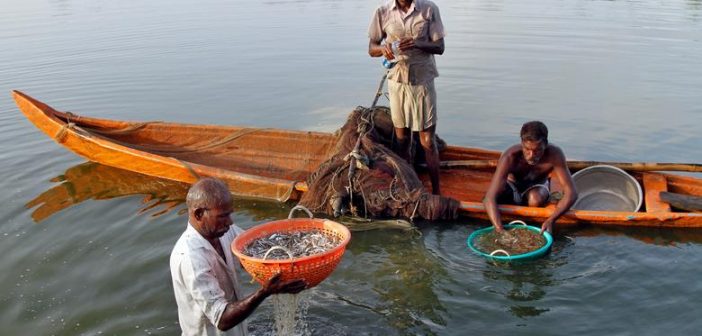The scent of freshly caught fish sizzling in a pan, the bustle of a crowded fish market, the sight of vibrant boats bobbing in the harbor – these iconic images of Indian coastal life are under threat. India’s vast coastline, once teeming with marine life, is now facing the devastating consequences of unchecked marine pollution. As a result, fish stocks are collapsing, livelihoods are disappearing, and the nation’s food security is hanging in the balance.
Pollution’s Toxic Toll
India’s marine pollution crisis stems from a toxic cocktail of factors:
- Industrial effluents: Factories and industrial plants often dump untreated wastewater directly into rivers and estuaries, ultimately flowing into the ocean. This wastewater carries heavy metals, toxic chemicals, and other harmful pollutants.
- Agricultural runoff: Excessive use of fertilizers and pesticides on farms washes into waterways during rains. These chemicals fuel algal blooms, which deplete oxygen levels in the water, suffocating fish and other marine life.
- Sewage and untreated waste: India’s rapid urbanization has outpaced waste management infrastructure. Much of the domestic sewage and garbage ends up directly in rivers or the sea, creating a breeding ground for harmful bacteria and further degrading water quality.
- Oil spills: Oil leaks and accidental spills from ships and offshore drilling operations contaminate large swaths of ocean, killing fish and other marine creatures.
Disappearing Fish Stocks and Damaged Ecosystems
The once-abundant fish populations in India’s coastal waters are bearing the brunt of this pollution. Several commercially important species are now scarce or entirely unavailable, including:
- Indian mackerel (Rastrelliger kanagurta): A staple food fish throughout India, mackerel stocks have plummeted due to overfishing and pollution-induced habitat destruction.
- Hilsa shad (Tenualosa ilisha): Beloved in Bengal and Bangladesh, this prized fish is now severely depleted, its migration routes disrupted by polluted rivers.
- Bombay duck (Harpodon nehereus): A unique and popular delicacy along the west coast, the Bombay duck is increasingly rare due to pollution.
- Tuna: Overfishing and pollution have taken a toll on tuna populations, impacting the livelihoods of commercial fishing fleets.
The loss of fish is not just about lost meals; it’s about cascading damage to entire ecosystems. Fish play a critical role in maintaining the delicate balance of the marine food web. Their decline disrupts the natural predator-prey relationship, destabilizing marine biodiversity. With fewer fish to control populations, harmful algal blooms proliferate, further choking the life out of coastal waters.
Human Cost: Fisherfolk on the Brink
The crisis extends far beyond dwindling fish stocks. It’s the millions of Indians who depend on fishing for their livelihoods who are being pushed to the brink. For countless coastal communities in India, fishing isn’t just a job; it’s a deeply ingrained cultural identity and a way of life. With less fish to catch, fisherfolk are forced to venture further out to sea, risking their lives in dangerous conditions. Many struggle to make ends meet, often trapped in a cycle of debt and despair.
Women play a vital role in the fishing industry, from processing and selling fish to mending nets and managing finances. The decline of fisheries disproportionately impacts women, leading to financial hardship and loss of economic agency.
Economic Repercussions for India
The fisheries sector plays a significant role in India’s economy, both in terms of food security and exports. Fish is a vital source of protein for millions of Indians, especially those living in poverty. As fish supplies dwindle, prices soar, making this essential food source inaccessible to many.
India is also a significant exporter of seafood. The decline in fisheries is hurting valuable export earnings, disrupting trade, and further straining the economy. Coastal tourism, which relies heavily on a healthy marine environment, is also taking a hit due to polluted beaches and degraded ecosystems.
Path to Recovery: Urgent Action Needed
1. Stricter regulations and enforcement: Implementing stronger environmental regulations and enforcing them rigorously is crucial. This includes holding polluters accountable, investing in wastewater treatment infrastructure, and regulating agricultural practices to minimize run-off.
2. Sustainable fishing practices: Overfishing needs to be addressed through stricter quotas, mesh size regulations, and promoting responsible fishing methods that minimize bycatch and environmental damage.
3. Marine protected areas: Establishing marine protected areas (MPAs) with strict regulations can help rebuild depleted fish stocks by allowing populations to recover within designated sanctuaries.
4. Public awareness and education: Raising public awareness about the consequences of marine pollution and the importance of sustainable fishing practices is crucial for fostering behavioral change and garnering support for conservation efforts.
5. Innovation and technology: Investing in innovative solutions like closed-loop aquaculture and alternative protein sources can help reduce pressure on wild fish populations.
6. International collaboration: Marine pollution is a global problem that requires international cooperation. India needs to work collaboratively with neighboring countries sharing maritime borders to address shared challenges and implement transboundary pollution control measures.
Beyond the Crisis: A Sustainable Future for India’s Fisheries
The decline of India’s fisheries is a stark reminder of the fragile state of our marine environment. It’s a wake-up call to prioritize sustainable practices and environmental protection. With collective action, responsible management, and a commitment to innovation, India can navigate this crisis, rebuild its fisheries, and ensure a healthy and sustainable future for its coastal communities and marine ecosystems.
The revival of India’s fisheries is not just about securing livelihoods and food security; it’s about protecting the cultural heritage, biodiversity, and ecological balance of the nation’s precious coastline. It’s a fight for the future of India’s vibrant marine ecosystems and the countless lives that depend on them.





